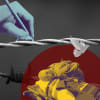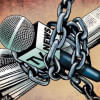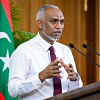Let the media do its job

World Press Freedom Day, observed yesterday across the globe, has given a grim report of the various onslaughts that journalists face today. It also underscores the importance of press freedom and reminds governments of their duty to respect peoples' right to freedom of expression.
In Bangladesh, restrictions on the right to freedom of expression have become more pronounced in the last five years, according to Article 19, a British rights organisation. In this year's World Press Freedom Index by Reporters Sans Frontières, Bangladesh's position remains unchanged: 146th among 180 countries. This indicates the worrying state of freedom of press, speech and expression in our country. In addition, the enactment of repressive laws, rise in extremism, and intimidation from intelligence agencies pose serious threats to freedom of expression and independent journalism.
Although in Bangladesh, there has been a proliferation of media—both print and electronic—resulting in quality of journalism sometimes suffering, this does not justify the growing intolerance of the authorities and severe restrictions on the freedom of the media. The government should allow the press to function freely for its own interest, because an independent press can best detect flaws and mistakes in the governing process, thus, help the government run the country better.
In Bangladesh's context, the challenges for the government in achieving the status of the middle-income country can best be faced with independent and responsible journalism, which was rapidly growing since the early 90s but is now severely constrained. We hope the government will allow the media to do its job in safeguarding people's interests, rights and freedoms, and holding those in power accountable.

 For all latest news, follow The Daily Star's Google News channel.
For all latest news, follow The Daily Star's Google News channel. 








Comments